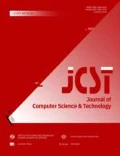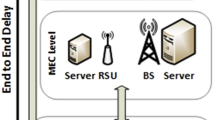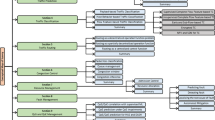Abstract
an analytical framework for the performance of different protection switching restoration mechanisms with different protection policies in Multi-Protocol Label Switching (MPLS) networks is developed, where the protection policy may be 1+1, 1:1,n:1 orn:m. As a general rule, it aims at the MPLS networks with the protection paths created in advance, of fault occurrence without resources reserved, and it reroutes the protected traffic in the event of link or router failures while trying to maintain quality of service (QoS) requirements. Based on the proposed protocol for processing faults, an analytical model and an evaluating model are created, and the benefits and penalties of different mechanisms with different protection policies are evaluated. In particular, an improvement on the proposed protocol is presented to overcome the drawbacks ofn:m protection policy in whichm> 1 andn> 1.
Similar content being viewed by others
References
Demetrios Stamatlakeis, Wayne D Grover. IP layer restoration and network planning based on virtual protection cycles.IEEE Journal on Selected Areas in Communications, October 2000, 18(10): 1938–1949.
John Doucette, Wayne D Grover. Bi-criteria studies of mesh network restoration path-length versus capacity tradeoffs. InOSA Optical Fiber Communications Conference (OFC 2001), Anaheim, Calif., March 17–22, 2001, pp.TuG2-1-TuG2–3.
Kodialam M, Lakshaman T V. Dynamic routing of locally restorable bandwidth guaranteed tunnels using aggregate link information. InProc. IEEE INFOCOM'01, Anchorage, Alaska, USA, April 2001, pp.376–385.
George Swallow. MPLS advantages for traffic engineering.IEEE Comm. Magazine, Dec. 1999, 37(12): 54–57.
Lemma Hundessa, Jordi Domingo Pascual. Fast rerouting mechanism for a protected switched path. InProc. IEEE I3CN'01, Scottsdale, Arizona, USA, October, 2001, pp.527–530.
Thomas M Chen, Tae H Oh. Reliable services in MPLS.IEEE Communications Magazine, 1999, 37(12): 58–62.
V Sharma, Fiffi Hellstrand. Framework for MPLS-based recovery.RFC 3469, February 2003.
Sharma V, Crane Bet al. Framework for MPLS-based recovery Internet-Draft, Work in Progress May 2002. http://www.ietf.org/internet-drafts/draft-ietf-mpls-recoverg-frmwrk-08.txt
Owens K, Sharma V, Oommen M. Network survivability considerations for traffic engineered IP networks. Internet-Draft, Work in Progress, May 2002. http://www.ietf.org/internet-drafts/draft-owenste-network-survivability-02.txt.
Daniel O Awduche. MPLS and traffic engineering in IP networks.IEEE Comm. Magazine, 1999, 37(12): 42–47.
Pan P (Ed.), Gan D H, Swallow Get al. Fast reroute extensions to RSVP-TE for LSP tunnels. Internet-Draft, Work in Progress, Jan. 2002. http://www.ietf.org/internet-drafts/draft-ietf-mpls-rsvp-lsp-fastreroute-02.txt.
Wai Sum Lai, Jim Boyle, Rob Coltunet al. Network Hierarchy and Multilayer Survivability. Internet-Draft, Work in Progress, July 2002. http://www. faqs.org/rfcs/rfc3386.html.
Changcheng Huang, Ken Owenset al. Bullding reliable MPLS networks using a path protection mechanism.IEEE Communication Magazine, 2002, 40(3): 156–162.
Apostolopoulos A, Guerin R, Kamat Set al. QoS routing mechanisms and OSPF extensions.RFC2676, 1999.
Author information
Authors and Affiliations
Corresponding author
Additional information
This work is supported in part, by the National Natural Science Foundation of China under Grant No.60202005 and the Project LX0240468 of Research Institute of Australia.
Xian-Si Tan received the M.S. degree in electronic engineering from Nanjing University of Science and Technology in 1992. He is an associate professor in the Department of Radar Engineering. His research interests include signal processing, data fusion, alloptical networks, fault restoration/protection, and sensor networks.
Zong-Kai Yang received the Ph.D. degree in electronic engineering from Xi'an Jiao-tong University in 1991. He is a professor of electronics and information engineering at Huazhong University of Science and Technology. He is also the vice-director of Dept. of Electronics and Information and director of the Center for Internet Technology and Engineering. His research interests include signal processing, neural networks, etc.
Liang Ou received the M.S. degree in electronic and information engineering from Huazhong University of Science and Technology in 2000. He is a Ph.D. candidate of Huazhong University of Science and Technology. His research interest is optical burst switching.
Jing-Wen Chen received the M.S. degree in microwave engineering from Xi'an Jiao-tong University in 1993. His research interest is QoS of Internet.
Ya-Jie Ma received the M.S. degree in electronics and information engineering from Huazhong University of Science and Technology in 2000. She is a lecturer of Information Science and Engineering at Wuhan University of Science and Technology. Her research interests include MPLS switching technology and its application in multicast.
Rights and permissions
About this article
Cite this article
Tan, XS., Yang, ZK., Ou, L. et al. An analytical framework for performance of different fault restoration policies with QoS constraints in MPLS networks. J. Comput. Sci. & Technol. 19, 158–167 (2004). https://doi.org/10.1007/BF02944793
Received:
Revised:
Issue Date:
DOI: https://doi.org/10.1007/BF02944793




